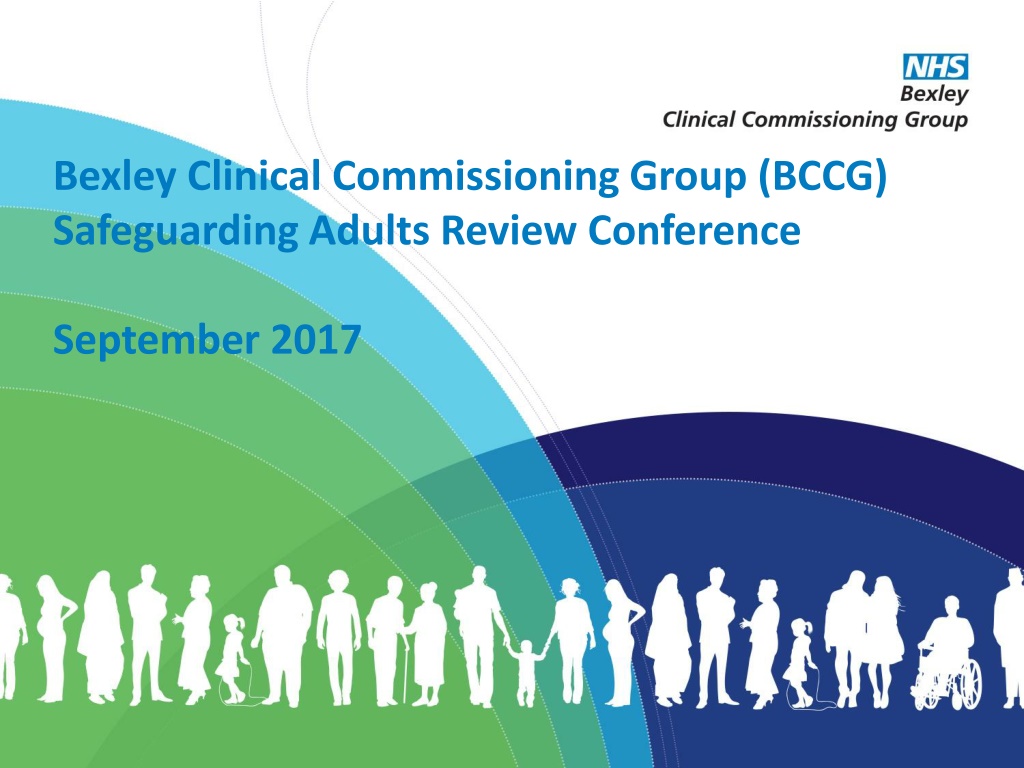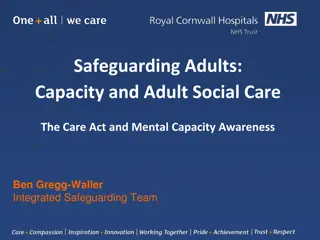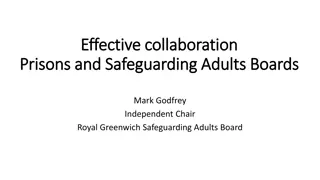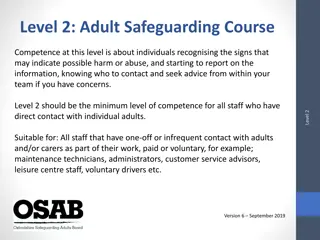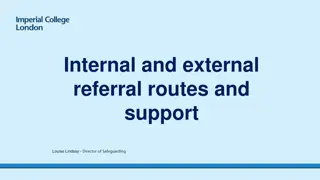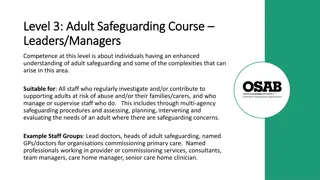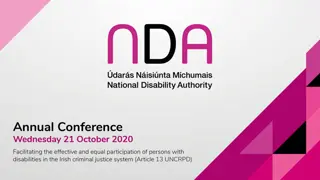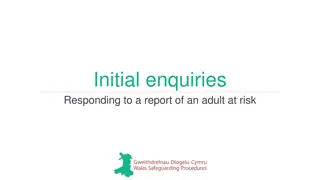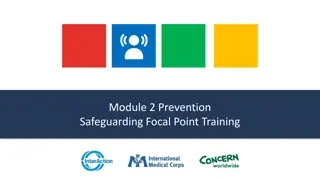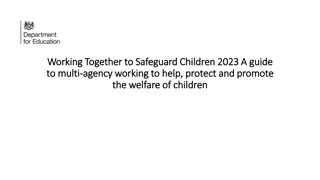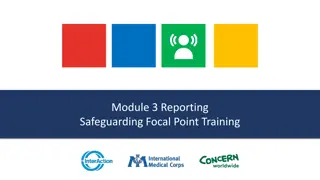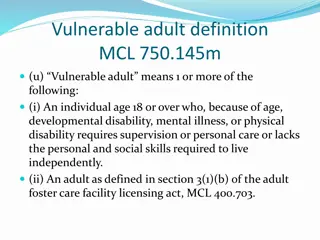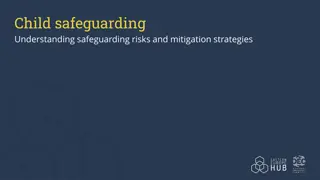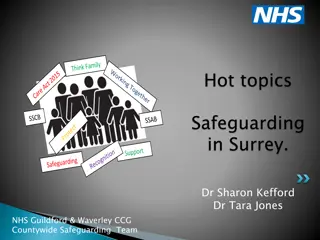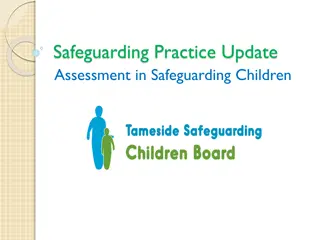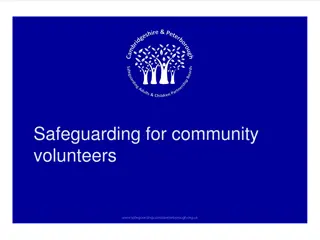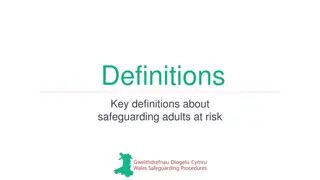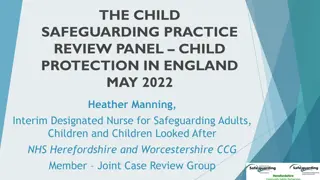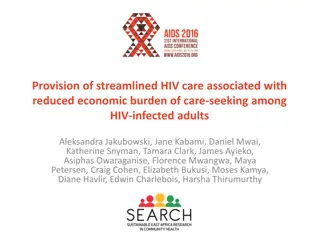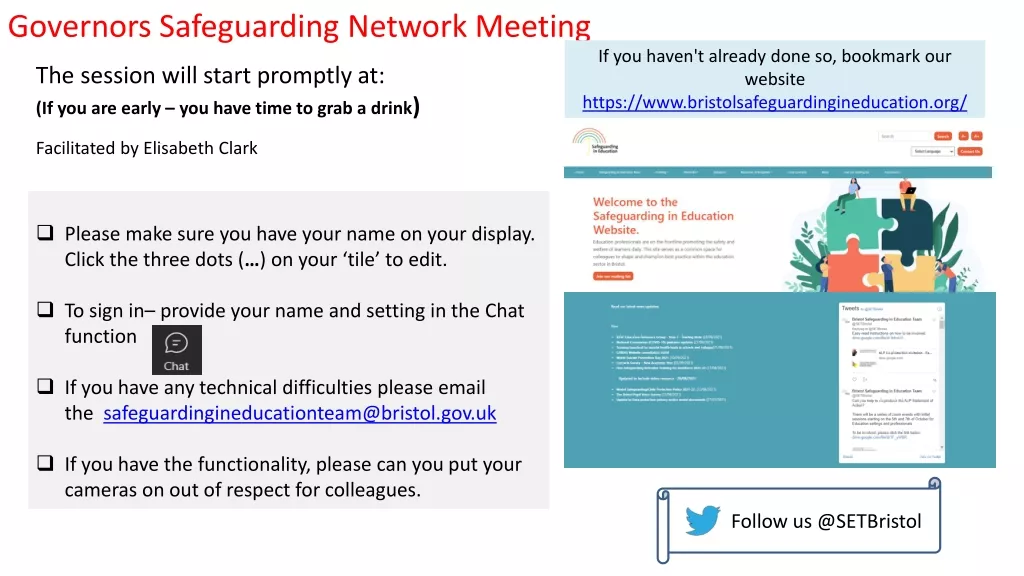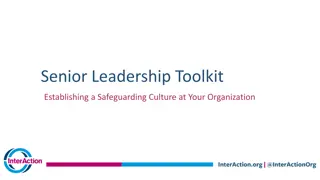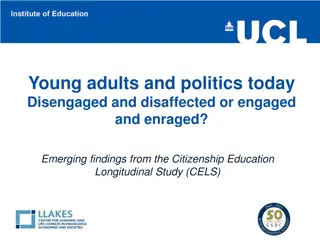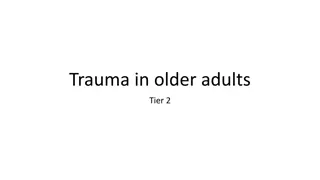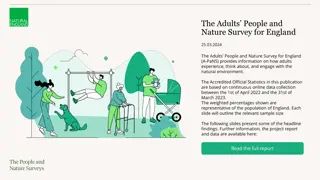Safeguarding Adults Review Conference: Enhancing Healthcare Locally
The Bexley Clinical Commissioning Group (BCCG) hosted a Safeguarding Adults Review Conference in September 2017, focusing on delivering excellent healthcare locally. Key topics discussed included processes for preventing and identifying self-neglect, communication patterns in long-term work, and the approach to differential diagnosis in healthcare settings. Recommendations were made to improve risk assessments and history-taking processes to enhance patient care and ensure robust, holistic practices.
Download Presentation

Please find below an Image/Link to download the presentation.
The content on the website is provided AS IS for your information and personal use only. It may not be sold, licensed, or shared on other websites without obtaining consent from the author. Download presentation by click this link. If you encounter any issues during the download, it is possible that the publisher has removed the file from their server.
E N D
Presentation Transcript
Bexley Clinical Commissioning Group (BCCG) Safeguarding Adults Review Conference September 2017 Excellent healthcare locally delivered
Michael Boyce Director of Quality, Governance & Performance Bexley Clinical Commissioning Group
Why Are We Here?
Questions for BCCG Are processes in place in health for prevention and identification of self neglect? Is there assurance that the processes are robust and holistic? What actions can be taken by the BCCG to ensure that learning is disseminated and embedded in practice?
Patterns of communication and collaboration in longer term work 5
Parallel or Sequential Diagnosis Finding 1 Is there a pattern of seeking the possible differential diagnoses for poor health causes sequentially, rather than exploring these in parallel? This can increase the risk that unusual causes for low weight (such as a working age man losing weight due to starvation) may not be identified, even when they are severe and possibly life-threatening.
Sequential Differential Diagnosis Question : What is the cost verses the benefits of the sequential pathway approach, and is it justifiable? What is known about how seriously low weight is being assessed locally? Response: GPs are required to refer patients to a specific pathway. The rationale for this approach is not savings based. BMI would usually be measured at first hospital contact The quality of history taking and risk assessment is key. Community provider has a policy to carry out Malnutrition Screening Test on the first contact. Issue arise where patients with mental capacity do not wish to engage or refuse services or assessment. Case Related: In the Safeguarding Adults Review case further exploration was declined by the patient once the cancer pathway was exhausted and engagement with professionals was limited. Bloods were taken and anaemia diagnosed.
Next Step Finding 1 Agree a process with Primary Care Providers for gaining assurance on the quality of risk assessment and history taking which might prompt nutritional screening.
Establishing Cause and Treating Symptoms Finding 2 Is there a medical norm of not treating the symptoms of chronic or acute weight loss, before the causes are known? If so, this inadvertently makes it more likely that practitioners will not respond to severe weight loss as an urgent health concern possibly requiring treatment in its own right.
Establishing Cause and Treating Symptoms Questions What is the medical norm in Bexley for calculating BMI and MUST scores. What is the medical norm of treating symptoms prior to cause being known Response Questionnaires used by GPs do not refer to appetite unless being screened for depression. (Possible that someone under 60 with no history of anorexia would be less likely to be considered to have an eating disorder) The priority for clinicians is to find the cause of the weight loss. Community Services have a policy on hydration and nutrition screening using the MUST tool on first contact with the patient. Community dietician now commissioned not at that time. Case Related Patient refused further tests once cancer was ruled out reasons for this do not appear to have been explored the patient was assumed to have capacity by all professionals involved. Assessments were completed by community care professionals muscle atrophy recorded and recorded as being the result of inactivity. Patient and family member confirmed to professionals that diet was good. It was noted by the acute service, and shared incidentally in a letter to the GP practice, that there had been significant weight loss. Anaemia was diagnosed and medication prescribed. Patient was resistant to intervention confirmed that he was eating well MUST was not calculated.
Next Step Finding 2 BMI and MUST recording will be discussed at the GP level 3 training in 2017 / 2018 and with the Practice Managers at the Forum in October 2017. Self neglect and SAR learning will be a focus of the level 3 training.
Management System Issues
Assumption of Mental Capacity and refusal of Service Finding 5 Respecting individual s decision making rights where they are assumed to have mental capacity, is discouraging health care professionals in Bexley from engaging the person in dialogue about the consequences of their actions or decisions.
Application of the Mental Capacity Act (MCA) Question What do the CCG know about awareness of MCA amongst health workers? Response Mental capacity is theoretically understood by health practitioners in the borough, assurance through audit, safeguarding dashboards, Contract Reviews, Safeguarding Committees and Clinical Quality Review Groups (CQRG). Patients autonomy is highly valued and can restrict professional challenge of unwise choices. The practical application of the MCA, particularly where someone, either with or without capacity, refuses services, indicates a need for more practice and case based training workshops. Self- neglect is already incorporated into safeguarding training and more case examples will be used in this training.
Mental Capacity Recent GP Audit found: Confidence of Health professionals from average to very confident in assessing capacity. Personal autonomy and right to choice are highly valued minimal challenge to refusal of care where capacity is assumed. There are different practice approaches to the use of a flagging system where adults are at risk of harm or self neglect. Where there is refusal or complexity a Multidisciplinary Team (MDT) process is relied on - However, there is no consistent process across agencies for recording of actions and oversight of completion. No lead co- ordinator of care (individual notes actions only). Case Related: In this case a mental health referral was thought appropriate but not followed up.
Next Steps Finding 5 To work with the SAB to ensure that there is a Mental Capacity Assessment / Self-Neglect High-Risk Escalation Process/Pathway Continued support in advertising and promotion of multi-agency training. Level 3 training to focus on self neglect and mental capacity. Discussions with providers on professional challenge and best interest decision making when patients refuse care or make unwise choices at Safeguarding Committees of Community, Acute trust and at Care Home Provider Forums. Guidance on MDT process and follow up enquiries
GP Attendance at Child Protection Meetings Finding 11 It is accepted that the right health professionals, especially GPs, are generally not able to attend child protection meetings, meaning cases where a parent s physical health is critical to parenting issues are reliant on written reports, where discussion and shared analysis is required in order to attend better to the parent s health needs as well as the children s welfare.
GP Views On Attendance At Child Protection Conference Recent GP audit: Where unable to attend full report completed. Report and telephone calls where required. Viewed as a priority but releasing staff sometimes difficult.
Next Step Finding 11 Undertake an audit regarding attendance at Child protection meetings to ascertain level and quality of input. Identify what support is required for practices to maintain /increase attendance.
Management System Issues
Self Neglect Workforce Awareness Finding 3: Are professionals across primary and acute health care, district nursing, community rehabilitation, adult social care and children s social care, not considering depression and/or the continuum between good self-care and self-neglect where someone is relatively young and living with others, even where there are relevant indicators such as: weight loss, lack of self-care, loss of motivation, staying in bed and not leaving the house? This potentially leaves people in such circumstances inadequately assessed or helped, if the risks associated with significant self-neglect are not recognised as such.
Self Neglect Workforce Awareness What is known: Some, but not all agencies use a system for flagging adults at risk of harm or self neglect. Perception that nothing can or will be done particularly where the adult at risk has mental capacity high level of respect for individual autonomy. GPs can feel unsupported when people with mental health issues are referred back to them. Assurance needed that all health professionals are aware that self neglect is an adult safeguarding issue. Case related There was an intention to refer to Mental Health Services so depression was considered here. At the time of this case self neglect was no reportable under the safeguarding procedures
Next Steps Finding 3 Level 3 training to be focussed on self neglect and mental capacity. Article in the CCG weekly bulletin Encourage all agencies to risk assess and share information as appropriate on people who could be self neglecting. Promote borough multiagency complex case escalation process once agreed. Self neglect to be discussed in December 2017 safeguarding committees.
Human Biases Cognitive & Emotional
Holistic Assessment Finding 6: There can be a tendency not to see the adult patient when with children as a parent with parental responsibilities; particularly when the patient is the father, rather than the mother. This means that the impact of poor health on parenting ability and the impact on the children (and partner) is not given sufficient priority.
Holistic Assessment What we know: Recent GP Audit: GPs are aware of the need to identify carers and involve social services. Family issues are discussed with Health Visitors and at MDTs (MDT recording and governance inconsistent across services). Risk assessments carried out. Referrals to Social Services if risk assessment indicates this. Case Related: Limited evidence of holistic assessment, in this case possibly due to the fact that Social Services were already involved with the family.
Next Steps Finding 6 - Focus of training sessions: Regardless of gender the carer responsibilities should be considered and risk assessed. Gain assurance from commissioned providers that procedures are in place to ensure holistic assessments are completed.
Conclusions Are processes in place in health for prevention and identification of self neglect? Nutritional screening policies and tools are in place . There is a lack of confidence and provision for escalation of complex cases where a patient has the mental capacity to make choices. MDT processes are in place. Is there assurance that the processes are robust? There is limited assurance that all health workers in Bexley have sufficient knowledge, skill and confidence to challenge unwise decisions of people assessed as having mental capacity. Limited assurance on the effectiveness of the MDT processes and of holistic assessment. What part can BCCG take in preventing a death from self neglect , of a person known to public services, happening again in Bexley. Implement next step actions as above and monitor progress, reporting back to the Safeguarding adults Board as necessary.
Commitment From CCG Overseeing implementation of multi agency action plans through the Adult and Children's Safeguarding Boards, Safeguarding Committees, Clinical Quality Review Groups and Contract Management Boards
Comments from NHS England
NHS England (London Region) Commitments Support continuing improvements to practice in the NHS system. Identifying system weaknesses and wider opportunities for learning. Constantly improve outcomes for children and adults. Commissioned projects across the health economy. www.england.nhs.uk 31
